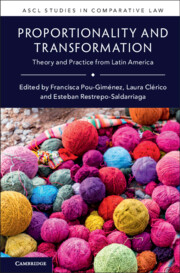Book contents
- Proportionality and Transformation
- Ascl Studies in Comparative Law
- Proportionality and Transformation
- Copyright page
- Contents
- Editors
- Contributors
- Acknowledgments
- Introduction
- Part I Proportionality and Processes of Constitutionalization
- Part II Proportionality in Social Rights and Equality-Based Adjudication
- Part III Proportionality, between Transformation and the Status Quo
- 10 Between Exception and Transition
- 11 Proportionality and State Ius Puniendi
- 12 Distributional Analysis as an Alternative to Proportionality Analysis in Judicial Decision-Making
- 13 Proportionality, Social Justice and Democracy
- 14 Unilateralism, Dialogue and False Necessity
- Epilogue
- Index
Epilogue
The Elephant in the Room
from Part III - Proportionality, between Transformation and the Status Quo
Published online by Cambridge University Press: 27 October 2022
- Proportionality and Transformation
- Ascl Studies in Comparative Law
- Proportionality and Transformation
- Copyright page
- Contents
- Editors
- Contributors
- Acknowledgments
- Introduction
- Part I Proportionality and Processes of Constitutionalization
- Part II Proportionality in Social Rights and Equality-Based Adjudication
- Part III Proportionality, between Transformation and the Status Quo
- 10 Between Exception and Transition
- 11 Proportionality and State Ius Puniendi
- 12 Distributional Analysis as an Alternative to Proportionality Analysis in Judicial Decision-Making
- 13 Proportionality, Social Justice and Democracy
- 14 Unilateralism, Dialogue and False Necessity
- Epilogue
- Index
Summary
This chapter explores the contrasting role of proportionality discourse in the USA and in Latin America. Although the USA provided an important constitutional model for Latin American countries, the latter does not share the former’s disinterest in the proportionality framework, which is considered foreign to the legal tradition of the country despite the fact it is arguably harmonic with the approach to law creation in the common law tradition. The chapter seeks possible explanations for the contrast in four elements: the importance in Latin America of centralized, specialized constitutional jurisdiction; the tradition of borrowing constitutional jurisprudence from abroad; the openness to constitutional change and innovation; and sensitivity to the egalitarian potential of rights review, even if that potential remains largely unrealized, which favors experimentation around proportionality. The USA sits at the opposite end of the spectrum along each of the dimensions that support proportionality analysis.
Keywords
- Type
- Chapter
- Information
- Proportionality and TransformationTheory and Practice from Latin America, pp. 309 - 324Publisher: Cambridge University PressPrint publication year: 2022

